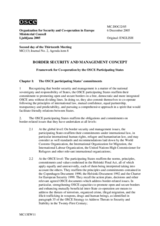
Combatting Illicit Trafficking in Cultural Property

The OSCE supports its participating States and Partners for Co-operation in the fight against the illicit cross-border trafficking in cultural property and the close linkages to organized crime, financing of terrorism and money laundering.

Quick links
Our work
Our thematic and programmatic focus areas
The trafficking and sale of stolen art, antiquities and cultural property has increasingly become a prime source of income for internationally operating organized crime groups. The annual illicit market for heritage goods is estimated at more than US$6 billion, making it one of the largest under-regulated and illicit markets worldwide, with close ties to organized crime and the financing of terrorism, and a vehicle for international money laundering. The dramatic upsurge experienced in the last years has also affected OSCE participating States and Partners for Co-operation, which have experienced unlawful looting of archaeological sites and illicit cross-border smuggling of priceless stolen objects.
Recognizing the challenge to confront this crime across borders and across fields of expertise, the Transnational Threats Department began working with border management and law enforcement services in 2016 to combat this crime. In 2021, it launched a flagship project that supports regional and cross-agency approaches in addressing heritage crime and trafficking in cultural property at legislative, strategic, operational and law enforcement levels. A year later, it established the OSCE-led Heritage Crime Task Force, a unique international expert team comprising representatives of border security agencies, customs, police, crime scene and financial investigators, museums, ministries of culture and state prosecutors. This Task Force can be deployed in the OSCE area to respond to requests for support to border management and law enforcement agencies in emerging crises or cold cases; to deliver cutting edge and technology-supported operational training to disrupt trafficking networks, both on land and in maritime environments; and to support co-operation in the cross-border prosecution and repatriation of the stolen objects.
Projects
Initiatives funded by individual states and organizations
Resources
Official OSCE documents, publications and other manually selected resources



